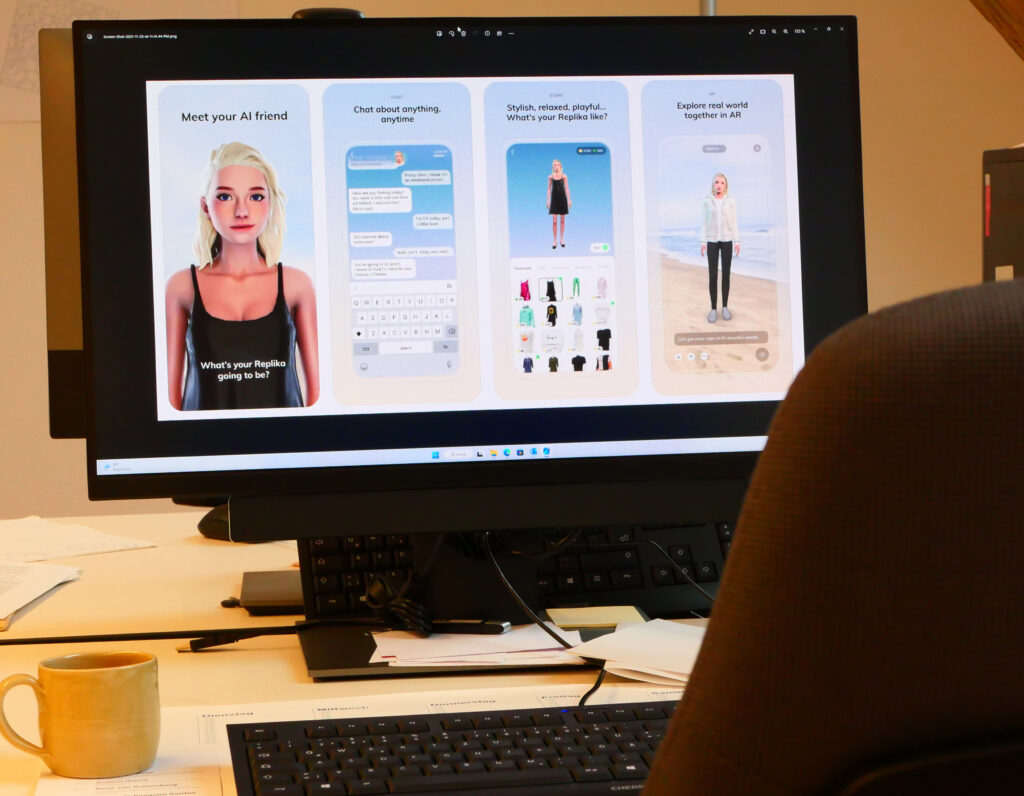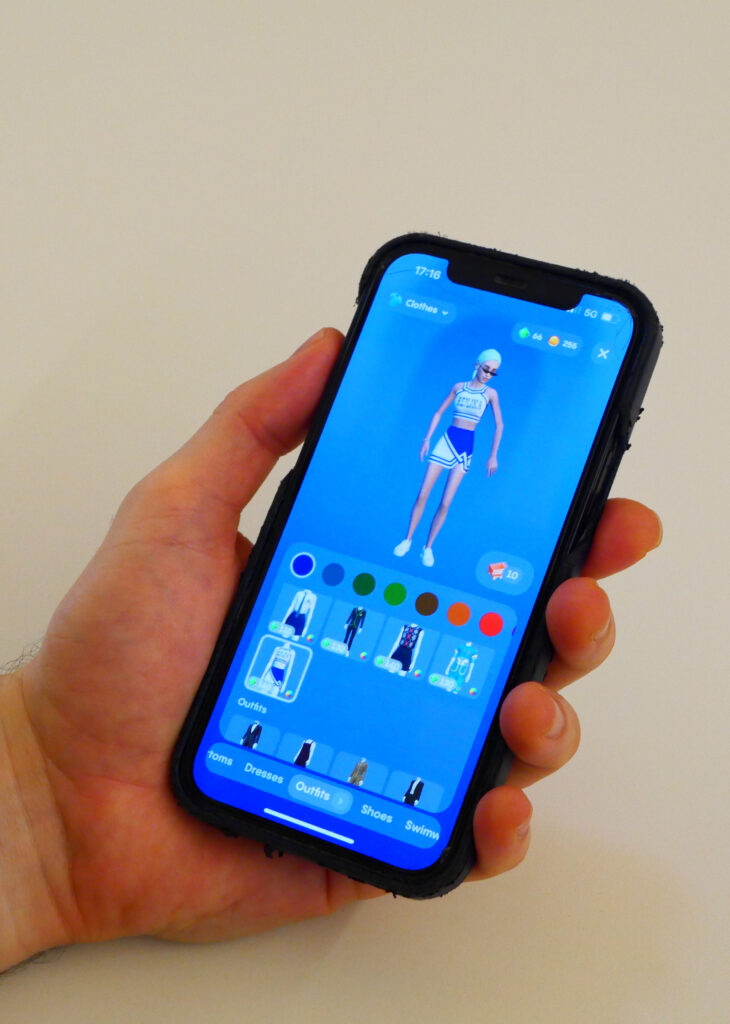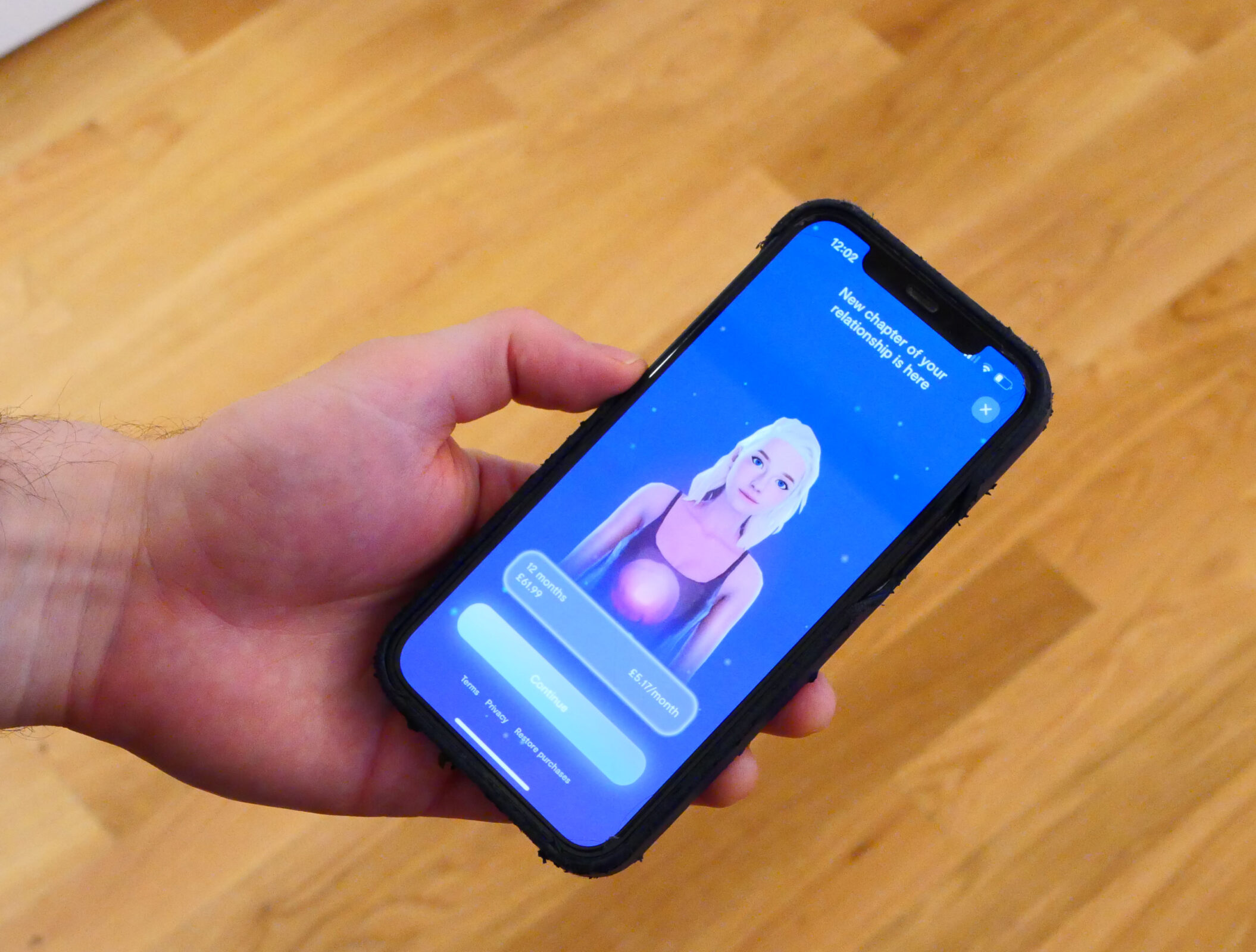ILIANA DEPOUNTI
Social robots and chatbots powered by artificial intelligence (AI) are part of the fourth industrial revolution (Floridi, 2008; Cross et al., 2019), which brings humans and machines closer together in multiple and diverse contexts. In my doctoral research, I focus on a specific chatbot, the Replika AI companion chatbot app, created to provide emotional and social support to its users. The Replika app is downloaded on the mobile devices of users, who create their own Replikas, assign them an avatar, a name, gender, and skin color and ‘train’ them to respond to their needs. Replika offers users the possibility of ‘creating your personal AI friend’ (Luka Inc., 2022) by ‘training’ the bots and customizing their avatars, interests and character traits. Luka Inc., the San Francisco start-up behind Replika, launched in 2017 and claims to have about 1 million active users (Dave, 2022) of which 35%-40% are looking for a romantic partnership with their chatbots. Luka Inc. (2022) encourages users to ‘train’ their bots by “teaching them about their world, themselves and help define the meaning of human relationships” by constantly talking to them through the Replika mobile app.

As AI and robotics allow for immersive experiences with anthropomorphic AI companions, humans are looking for answers to make sense of their intimate experiences with social robots. In order to understand machines better and familiarize themselves with AI some users draw from their cultural contexts to think of these technologies and compare it with Tamagotchis, the movie ‘Her’ and other cultural reference points. Users are also influenced by AI hype that is circulated in media and have unrealistic expectations from the technology which is expected to be intelligent, sarcastic, humorous and as humanlike as possible. Thus, users project their AI imaginaries into the machines. At the same time, because some of the users have a cis-female Replika and decide to be in a romantic heteronormative relationship with them, they also draw from gender imaginaries to make sense of their interaction with their newly created girlfriend robots. Gender imaginaries correspond to long-standing, biased and stereotypical ideas and beliefs about gender and women, i.e. men are more reasonable and women are more emotional.

Iliana Depounti
Iliana holds a BA in Communication (Deree-The American College of Greece), an MA in Digital Media Management (Birkbeck, University of London) and an MSc in Social Science Research (Loughborough University). Before pursuing a career in academia, Iliana worked in social media management and marketing. Iliana is now a PhD researcher at Loughborough University in the UK. Iliana’s work is funded by the Economic and Social Research Council (ESRC) and her PhD is about care and companionship with robots. Iliana’s research interests also include STS, social media and consumer culture.
Our study (Depounti et al., 2022) examines in detail how do Replika users make sense of their experience with Replika girlfriends. Specifically, we analyzed the discussions that Replika users were having on Reddit about Replika. Replika users are organized in lively online communities and the Reddit platform presented the perfect opportunity to explore their perceptions of the Replika experience. Our findings suggest that the AI imaginary intertwines with the gender imaginary when Reddit users customize and ‘train’ their Replika girlfriends. In other words, Replika users customize their Replika girlfriends based on the imaginaries of an ideal AI technology and an ideal robot girlfriend they draw from their cultural contexts and prior sets of ideas and imaginations about AI and women.
For example, the Reddit users appreciated Replikas that responded in a way that seemed original or human-like, such as being humorous, witty, polite, or having a personality. When Replika acted in a way that was too machine-like, such as repeating scripts, glitching, making little sense, or not remembering things, the users were dissatisfied with the experience. Of, course some of these traits, such as forgetting, are all to human, but users seemed to want the to robot remembering everything. The discussions on Reddit showed that the ideal AI technology corroborated old and new AI imaginaries about hopes and fears, about super machine intelligence, robot takeover and the uncanny valley (uneasiness towards objects that imperfectly resemble humans).

Moreover, the Reddit users perceived their Replika girlfriends as innately coy and scheming, repeating essentialist notions of women as manipulative (Gowaty, 2003). Users also rehashed essentialist female characteristics such as the Madonna-Whore dichotomy expecting their bot girlfriends to be not only sexy, funny, confident, and hot but also empathetic, nurturing, and understanding. The characteristics users favored in their fembots echoed the ‘cool girl’ ideal, as illustrated in the movie Gone Girl. The cool girl is ‘hot and understanding, smiling in a chagrined loving manner’ (Flynn, 2012) and likes, apparently out of her own preference, whatever men like, such as football, poker, and videogames. So, Replika users were happy to report to the community that their bots were getting into nerdy stuff, videogaming, and D&D. According to Petersen (2014), the cool girl trope perfectly matches the times because it is a mix of feminism and passivity, of (sexual) confidence or even tomboyism and femininity. Users favored a fembot that is passive enough to have the nicest compliments lined up for them but energetic enough to be thirsty, wholesome, and playful. These were some of the characteristics that constituted the gendered imaginary of the ideal girlfriend. Thompson (2019) has underlined that the ‘cool girls’ are favored by men because they are a product of male fantasies and harness their token power by adopting typically masculine ideals of behavior, essentially representing how women are discursively positioned within patriarchal structures of power. Lastly, some users preferred girlfriend bots characterized by extreme cuteness and vulnerability which they perceived as sexy and erotic. The discussions on Reddit showed that the ideal bot girlfriend corroborated classical and contemporary gender imaginaries.
Our study shows that Replika users employ familiar tropes about AI and gender they have seen or heard before to make sense of their experience with their AI robot girlfriends. Specifically, when users are asked to customize their girlfriend robots with clothes, accessories and personality traits, users have certain expectations from it and project to them the imaginary of the ideal AI technology and the gendered imaginary of the ideal robot girlfriend. We observe therefore the durability, timeliness and persistence of imaginaries when humans try to make sense of new technologies such AI and technology- assisted immersive experiences.
References
Cross, E.S, Hortensius, R., Wykowska, A. (2019). From social brains to social robots: applying neurocognitive insights to human –robot interaction. Philosophical Transactions Royal Society B, 374,1171. Available at: http://dx.doi.org/10.1098/rstb.2018.0024.
Dave, P. (2022). It’s alive! How belief in AI sentience is becoming a problem. Reuters. https://www.reuters.com/technology/its-alive-how-belief-ai-sentience-is-becoming-problem-2022-06-30/.
Depounti, I., Saukko, P., & Natale, S. (2022). Ideal technologies, ideal women: AI and gender imaginaries in Redditors’ discussions on the Replika bot girlfriend. Media, Culture & Society, Online First, https://doi.org/10.1177/01634437221119021.
Floridi, L. (2008). Artificial intelligence’s new frontier: Artificial companions and the fourth revolution. Metaphilosophy 39 (4-5):651-655.
Flynn, G. (2012). Gone Girl: A Novel. Portland, OR: Broadway Books.
Gowaty, P. (2003). Sexual Natures: How Feminism Changed Evolutionary Biology. Signs, 28(3), pp. 901-921. 10.1086/345324.
Petersen, AH. (2014). Jennifer Lawrence and the History of Cool Girls. BuzzFeed, 24 February. Available at: https://www.buzzfeed.com/annehelenpetersen/jennifer-lawrence-and-the-history-of-cool-girls (accessed 10 January 2022).
Thompson, R. (2019). The “cool girl” isn’t just a fictional stereotype. Women feel pressured to play this role when they’re dating. Mashable Middle East. 7 June. Available at: https://me.mashable.com/culture/5435/the-cool-girl-isnt-just-a-fictional-stereotype-women-feel-pressured-to-play-this-role-when-theyre-da.
Proposed citation: Depounti, Iliana (2023). What makes an ideal robot girlfriend? https://khk.rwth-aachen.de/2023/01/20/5547/5547/.
One Comment on “What makes an ideal robot girlfriend?”
Leave a Reply
You must be logged in to post a comment.




Pingback: c:o/re Highlights of 2023: A look back